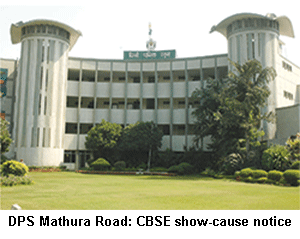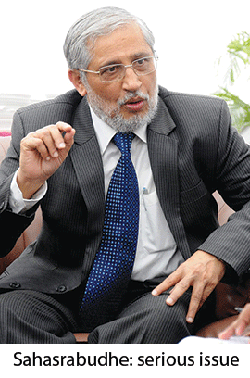 Notwithstanding a detailed cover story in EducationWorld (February 2017) in which several principals of the country’s top-ranked schools affiliated with the Central Board of Secondary Education (CBSE) roundly criticised the pan-India school-leaving examination board for excessive interference, this Delhi-based nominally autonomous exam board, which is under the supervisory jurisdiction of the Union human resource development (HRD) ministry, hasn’t mended its ways.
Notwithstanding a detailed cover story in EducationWorld (February 2017) in which several principals of the country’s top-ranked schools affiliated with the Central Board of Secondary Education (CBSE) roundly criticised the pan-India school-leaving examination board for excessive interference, this Delhi-based nominally autonomous exam board, which is under the supervisory jurisdiction of the Union human resource development (HRD) ministry, hasn’t mended its ways.
On April 19, the board issued a circular to its 18,778 — including 13,657 private unaided (financially independent) — affiliated schools countrywide to refrain from advising parents to buy books, uniforms, shoes, bags etc from selected vendors and “use only the textbooks issued by the Delhi-based National Council of Educational Research and Training,” (NCERT, an autonomous body also under the supervisory jurisdiction of the HRD ministry). Citing rule 19.1 (ii) of its bye-laws, it said “managements shall ensure that school is run as a community service and not as a business and that commercialisation does not take place in the school in any shape whatsoever... there is a nexus of profiteering. But our affiliations (sic) are clear that schools are a community service and not commercial entities. It is mandatory for schools to adhere to the provisions,” said the circular signed by Rakesh Kumar Chaturvedi, a former bureaucrat, appointed chairman of CBSE in July 2016.
Last December, Chaturvedi issued a circular under Rule 25.2 (a) of the CBSE’s bye-laws changing the composition of the managing committees of CBSE affiliated private schools to effectively vest power to appoint principals in the Central government. This circular prompted the Society for Unaided Private Schools of Rajasthan (SUPSR) to revive a writ petition (No.6510 of 2013) in the Delhi high court challenging the ambit of CBSE power. According to the petition, CBSE is a mere school-leaving examinations board with no power to regulate or prescribe administrative and regulatory norms for affiliated schools.
Even as this writ petition is pending adjudication, on April 20, CBSE issued a disaffiliation show-cause notice to Delhi Public School, Mathura Road for re-appointing well-qualified educationist Manohar Lal, who has more than three decades of teaching and administrative experience, as the school’s principal. According to the show-cause notice, the board’s affiliation bye-laws (amended in December last year), mandate a retirement age of 60 for principals of affiliated schools.
“CBSE is merely an examinations board authorised to conduct examinations. Therefore all its bye-laws relating to tuition fees, textbooks, uniforms, composition of managing and selection committees are illegal and ultra vires,” says Damodar Goyal, founder-president of SUPSR (estb.1997).
Nor is SUPSR the only representative organisation of private schools fed up with the interference and command-and-control circulars of overbearing bureaucrats in CBSE and the Union HRD ministry. The Delhi-based National Independent Schools Alliance (NISA, estb.2011), which represents over 36,400 budget private schools across the country, is also set to go to court against a CBSE circular dated April 12 which threatens to impose a penalty of Rs.50,000 on schools that don’t make financial disclosures under the board’s bye-laws. “The board is continually deviating from its purpose and intervening in the operations of affiliated schools. The illegal circular that imposes a fine for not furnishing financial information should be withdrawn immediately,” says NISA president Kulbhushan Sharma.
Although in an interlocutary hearing of the SUPSR’s petition in the Delhi high court on February 9, counsel for CBSE informed the court that the circular changing the composition of selection committees to choose principals and faculty of affiliated schools is being “held in abeyance for the time being,” the board has nevertheless issued a disaffiliation notice to the DPS, Mathura Rd school management.
Quite clearly, Chaturvedi and the babus who have taken charge of CBSE will get over their control-and-command mindset only after the courts pass severe strictures against them.
Swati Roy (Delhi)
Faulty diagnosis
 Hard on the heels of the Supreme Court upholding the introduction of a common entrance exam — NEET (national eligibility-cum-entrance test) — conducted by the Central government last April (2016) for admission into medical and dental colleges countrywide, the Union HRD ministry has mooted a common entrance exam for admission into the country’s 3,470 engineering colleges and institutes. The National Entrance Examination for Technical Institutions (NEETI) will be conducted online by the newly established National Testing Service (NTS) proposed in the Union Budget 2017-18 from 2018 onwards. According to HRD ministry sources, NEETI will be conducted several times per year.
Hard on the heels of the Supreme Court upholding the introduction of a common entrance exam — NEET (national eligibility-cum-entrance test) — conducted by the Central government last April (2016) for admission into medical and dental colleges countrywide, the Union HRD ministry has mooted a common entrance exam for admission into the country’s 3,470 engineering colleges and institutes. The National Entrance Examination for Technical Institutions (NEETI) will be conducted online by the newly established National Testing Service (NTS) proposed in the Union Budget 2017-18 from 2018 onwards. According to HRD ministry sources, NEETI will be conducted several times per year.
However, NEETI hasn’t been universally welcomed, particularly by the state governments of West Bengal and Tamil Nadu. The latter had drafted a Bill to override the apex court’s NEET judgement and admit students into Tamil Nadu’s 22 government, 13 private and ten deemed medical universities/institutes on the basis of class XII board exam scores. The All India Council for Technical Education (AICTE), which supervises and regulates technical education countrywide, has invited these states for discussions on the proposed NEETI.
Although the prime reason advanced by the HRD ministry for introducing NEET and NEETI is that single common entrance tests for medical and engineering colleges will end inconvenience of students who currently need to write multiple entrance exams in multiple locations, an unstated objective of a rigorous national entrance exam is also to restrict admission into engineering institutes to students with aptitude and adequate knowledge. The government’s belated awareness about the poor quality of students entering and graduating from engineering institutes is being welcomed by informed academics.
Studies and surveys conducted by industry associations such as FICCI and CII indicate that the quality of engineering and technical education being dispensed by the majority of poorly staffed and under-equipped colleges is abysmal. A 2005 study conducted by Nasscom-Mckinsey World Institute shocked the nation by suggesting that 75 percent of the country’s engineering graduates are unemployable in self-respecting Indian and foreign multinationals. A more recent (2016) report of the Delhi-based Aspiring Minds Pvt. Ltd — a skills testing and assessment company — concluded that 80 percent of engineering graduates are unemployable in organised sector IT companies.
Moreover, a recent AICTE survey indicates that only 15 percent of engineering study programmes offered by the country’s 3,470 engineering institutes are accredited by the National Board of Accreditation (NBA), and less than one percent of engineering students participate in summer internships.
Therefore, coterminously with announcing NEETI, AICTE has resolved to periodically suggest syllabus revision and upgradation, provide teacher training and make two to three month internships mandatory for all undergrad students. Anil D. Sahasrabudhe, the highly-respected former director of the College of Engineering, Pune (estb.1848) who was appointed chairman of AICTE in 2015, admits that 60 percent of engineering graduates aren’t industry-ready.
“The critical importance of faculty development has to be understood and AICTE is addressing this issue seriously. Currently, we are preparing a two-three month teaching module for engineering faculty to upgrade their pedagogy and research skills. Moreover, SWAYAM (Study Webs of Active Learning for Young Aspiring Minds), an online platform of the Union HRD ministry, will also offer faculty development programmes and we expect teachers to benefit from it,” says Sahasrabudhe.
Dr. Manpreet Singh Manna, director, AICTE and author of Higher Education Faculty Career Orientation and Advancement (2017), also believes that faculty training and upgradation is critical for raising teaching-learning standards in technical education. “A substantial number of teachers are in education not by choice or passion but for gainful employment. But once they get access to training and development programmes, they are certain to become more involved in teaching and research as well. Once teachers start teaching well, students’ learning outcomes are bound to improve,” says Manna.
Common entrance exams seem to be the miracle panacea of the BJP government at the Centre. But quite clearly they are merely the first step towards revamping engineering and technical education countrywide. Decades of neglect and ineffective supervision have allowed the rot to seep deep into the great majority of the country’s engineering and technology institutions. In the circumstances NEETI and tighter AICTE supervision are overdue initiatives.
Autar Nehru (Delhi)